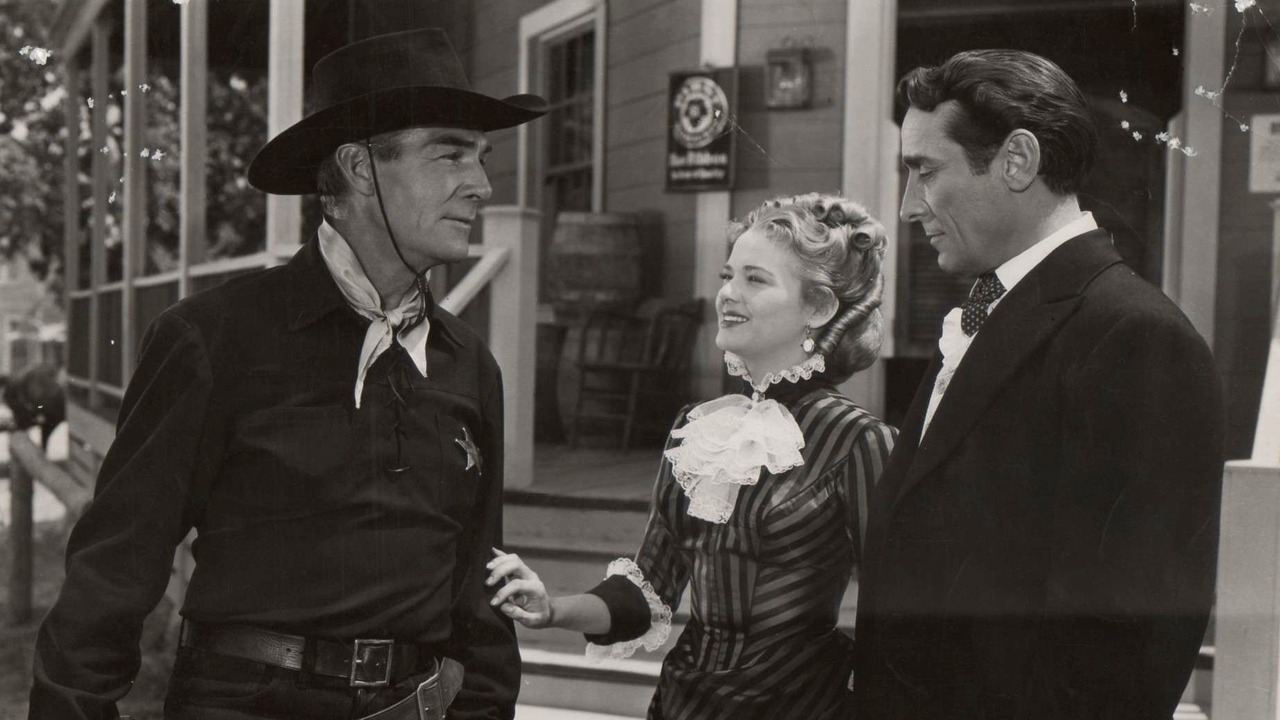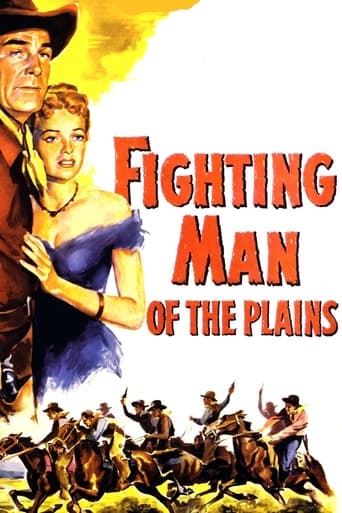Laikals
The greatest movie ever made..!
Invaderbank
The film creates a perfect balance between action and depth of basic needs, in the midst of an infertile atmosphere.
Rio Hayward
All of these films share one commonality, that being a kind of emotional center that humanizes a cast of monsters.
Marva-nova
Amazing worth wacthing. So good. Biased but well made with many good points.
MartinHafer
I am a huge fan of Randolph Scott's westerns, so it's sad that I felt so incredibly unimpressed by this film. Most of it is because I had a strong sense of having seen all this before...which I had. If you've seen as many Scott films as I have, you'll notice that this is at least the fourth film in which his character was somehow associated with Quantrill's Raiders--a group of thugs who violated every known rule for how to conduct campaigns during the Civil War. Killing civilians and terrorism were their trademarks and it wasn't surprising that several of this Confederate raiding party went on to careers as famous western criminals. Doing one or two films related to this group is just fine--but come on Randy, enough is enough!! What also felt recycled was his 'bad man turned good' storyline--it's very familiar indeed! The film begins showing the atrocities committed by the Quantrill gang and one of it's 'nicer' members (Scott--as Jim Dancer). Following the war, Dancer was an outlaw and continued to do bad things...though not nearly as bad as the James Brothers and a few of the other Quantrill thugs. He was bad...but only a wee bit bad!! Anyway, he is captured by a private detective and is being brought back to pay for his crimes. However, on the way, the detective drowns--with Scott handcuffed to him. Now here is the dumb part--when a group of settlers pass, they find Scott and the dead guy and automatically believe Scott's story that HE is the detective and that the dead detective is Jim Dancer!! He has no proof and it sure looked suspicious to everyone EXCEPT the folks who rescued him from the handcuffs!!! Later, Scott enters a crappy lawless town and manages to have himself appointed Sheriff! At first, he seems to be only doing it for the money but oddly he later takes the job seriously and conscientiously! Can Dancer turn his life around and live his life for good? Will someone recognize him for the dirty dog that he was? Will anyone remember that he's already made several other films JUST LIKE THIS ONE? Overall, a competent but far from rousing western that is full of silly plot holes and familiar themes. It's easy to skip this one unless you are a die-hard 'Scottophile'!
Robert J. Maxwell
Scott is arrested by James Millican, a detective for the Pleasonton Agency. The two have nothing personal against each other. When the detective is accidentally killed, someone has to cut off his hand to free Scott from the handcuffs. Scott takes the detective's place and, a bit later, is made sheriff of Lanyard, Kansas. He makes friends. He makes enemies. There are unscrupulous businessmen. Scott cleans the whole place up and gets the girl.By this point in his career Scott had decided, wisely, to turn out nothing but Westerns. He looked and acted the part well. According to Bob Osborne's commentary on TV, Scott enjoyed working out of doors, sitting back and reading the Wall Street Journal while the stunt men did the rough work. Scott was a keen investor and retired a wealthy man to the golf country of North Carolina without ever looking back at Hollywood. He bowed out after Sam Pekinpaugh's "Ride the High Country," a good note to leave on. He managed his career -- his life -- pretty well, all in all.Most of his Westerns were, if not exactly identical, cut from the same mold so the comparison of one to any of the others must depend on fine judgments about details. Is the film in glorious color? This one is not. Is the location interesting and evocative? Not this one, which looks like the San Fernando Valley used to look before the last inch of it was paved over. Better than usual support? No. Is Scott given any help from the script? An oddity of character? A quirk? An occasional wry turn of phrase? Not here. The result is a typical and not unrewarding Randolph Scott Western that doesn't distinguish itself from the many others he made in these years.Nice to see Victor Jory as something other than an open sleaze bag.
wfdickjr
If doing the right thing were easy, we would not need the movies. Nor would we need writers so brilliant as to think of telling the truth. As this movie shows so well, we all lie and we all tell the truth; the difference between right and wrong is not so much what we do but when we choose to do it. When a crook tells a lie and it is still somehow the truth, we are amazed. When a stalwart citizen tells the truth and it is still somehow a lie, we are even more amazed and still somehow not surprised. Why is that? Probably because we are, if you will excuse the expression, Americans. We believe in truth but we know the truth is often a lie. We believe in nothing except justice even when it is illegal. We have no way to explain that; we just know we have no choice. Our only real problem is that we continually need to be reminded. Watch crook Randolph Scott become a lawman, better than the best, and you will be reminded.
dondellison
I was just 6 years old when I saw "Fighting Man of the Plains"...my parents took me and my sisters to a drive-in movie in Indianapolis, Indiana. We used to go to the drive-in about once a month, because it was the best way for a young family to get a night out. What I remember most about the film is that rather early-on Randolph Scott is under arrest, and he and the lawman are taking a small raft-like ferry across some water, when a horse rears-up and its hoof smashes the lawman in the face. The movie was in color, and the close-up of the bloody face was mesmerizing. Randolph Scott then assumed the lawman's identity and went on to bring law and order to a lawless Kansas town. I grew-up to become a successful television news anchor/reporter and video producer...but I would love to see "Fighting Man of the Plains" again. It was a seminal moment in my childhood, and forever marked Randolph Scott...and westerns...as some of my favorite movie fare.

